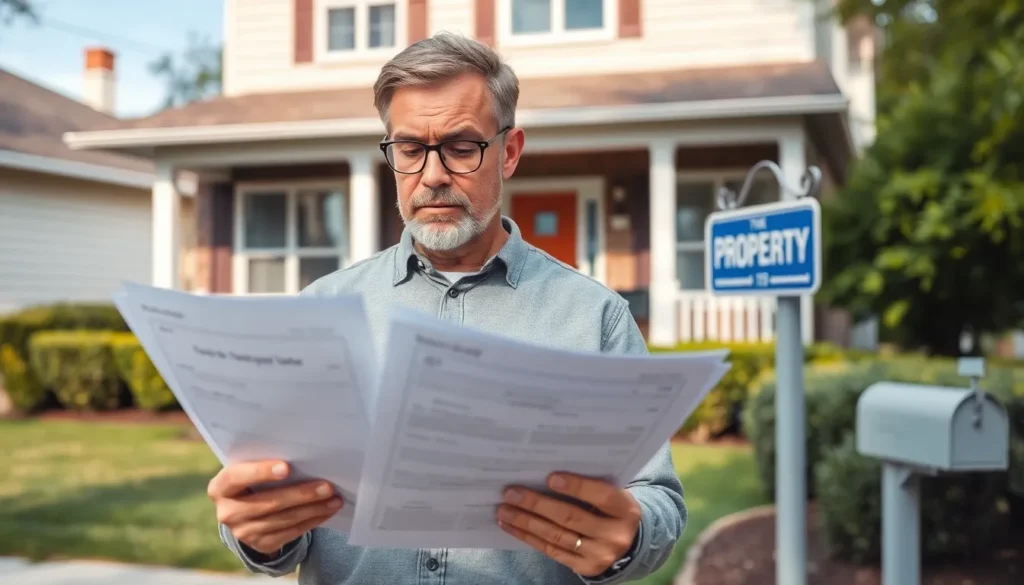Table of Contents
ToggleNavigating the world of owner financing can feel like trying to solve a Rubik’s Cube blindfolded. With so many moving parts, one question often pops up: who foots the bill for property taxes? It’s a bit like figuring out who pays for dinner when everyone insists they’re on a diet. Spoiler alert: it’s usually the one who ordered the most expensive dish!
Understanding Owner Financing
Owner financing outlines a method where the seller finances the buyer’s purchase directly. This arrangement enables buyers to bypass traditional mortgage lenders.
Definition of Owner Financing
Owner financing, commonly termed seller financing, refers to an agreement in which the seller offers a loan to the buyer to facilitate the purchase of a property. In this setup, the buyer repays the seller over time instead of a bank or mortgage company. Certain benefits accompany this approach, such as easier qualification requirements and flexibility in setting terms. Buyers often receive a quicker path to ownership, while sellers may find an increased pool of interested buyers.
How Owner Financing Works
Owner financing unfolds through a series of straightforward steps. Initially, the seller and buyer agree on the purchase price and financing terms. Payments are structured similarly to traditional loans, incorporating principal and interest. Buyers typically make regular monthly payments directly to the seller, who retains the title until payments conclude. Legal documentation, including a promissory note and deed of trust, formalizes the arrangement. Both parties should seek legal advice to ensure compliance with local regulations and clarity in their obligations.
Property Taxes in Owner Financing

Property taxes play a crucial role in real estate transactions, including owner financing arrangements. These taxes are levied by local governments to fund public services like education, infrastructure, and emergency services. Understanding their implications is essential for both buyers and sellers in owner financing situations.
Role of Property Taxes in Real Estate
Property taxes significantly impact the overall cost of homeownership. Tax assessments determine the amount owed, which may fluctuate based on local tax rates and property values. Buyers must account for these costs when entering an owner financing agreement, as tax responsibilities can influence monthly payments. Sellers, in turn, should be mindful of their property’s assessed value as it can affect the terms of financing. Overall, tax obligations should be a key consideration in any real estate deal, including those involving owner financing.
Who Typically Pays Property Taxes?
Legally, property owners are typically responsible for paying property taxes. In most owner financing agreements, the buyer assumes this responsibility, ensuring timely payments to the local tax authority. If the buyer defaults on these tax payments, the seller could face complications, including tax liens against the property. Often, sellers may incorporate tax considerations into the loan terms, adjusting the purchase price or payment structure accordingly. This arrangement can provide clarity and financial protection for both parties involved.
Agreements and Responsibilities
Owner financing agreements require clear expectations regarding property tax responsibilities. Both parties should understand their roles to avoid confusion.
Terms in Owner Financing Agreements
Terms within owner financing agreements frequently specify who pays property taxes. Typically, the buyer assumes this responsibility, allowing the seller to maintain a passive role. Parties often agree on payment schedules and how taxes are to be handled. Clarity in terms prevents disputes and encourages a smooth transaction. Documentation should explicitly outline tax obligations to eliminate ambiguity.
Importance of Clarity in Agreements
Clarity plays a crucial role in owner financing agreements. Ambiguous terms can lead to misunderstandings about responsibilities, particularly regarding property taxes. Both buyers and sellers benefit from clearly defined obligations, which fosters trust and transparency. By including specific clauses about tax responsibilities, parties can protect their interests and ensure compliance. Clear agreements also facilitate easier resolutions in case of disputes, making the entire process more straightforward and efficient.
Consequences of Non-Payment
Non-payment of property taxes can lead to serious repercussions for both buyers and sellers in owner financing arrangements. Understanding these consequences is crucial for maintaining financial stability and protecting interests in real estate transactions.
Legal Implications for Buyers
Buyers face immediate legal consequences when failing to pay property taxes. Tax liens can be placed on the property, leading to potential foreclosure actions by local governments. Such actions can result in loss of ownership and equity in the home. Buyers also risk damaging their credit score, making future borrowing more challenging. Clear terms within the financing agreement can help mitigate these risks, ensuring that buyers understand the significance of timely payments and the potential fallout of non-payment.
Impact on Sellers
Sellers experience significant ramifications if buyers neglect property tax payments. Sellers remain financially liable for the property taxes even if they’re not directly responsible for payment. If the buyer defaults, the seller may face tax liens on the property, which can complicate future sales and refinancing options. Including provisions in the financing agreement that outline tax responsibilities can protect sellers and maintain clarity around financial obligations. Clear communication about these potential impacts helps ensure both parties remain informed and collaborative throughout the financing process.
Understanding who pays property taxes in owner financing arrangements is crucial for both buyers and sellers. Clear communication and well-defined terms in the financing agreement can prevent misunderstandings and protect both parties’ interests. Typically, buyers take on the responsibility for property taxes, but sellers should remain aware of their potential liabilities. By addressing tax obligations upfront, both parties can foster a smoother transaction and avoid complications down the line. A transparent approach to property tax responsibilities not only enhances trust but also contributes to a more efficient owner financing process.






